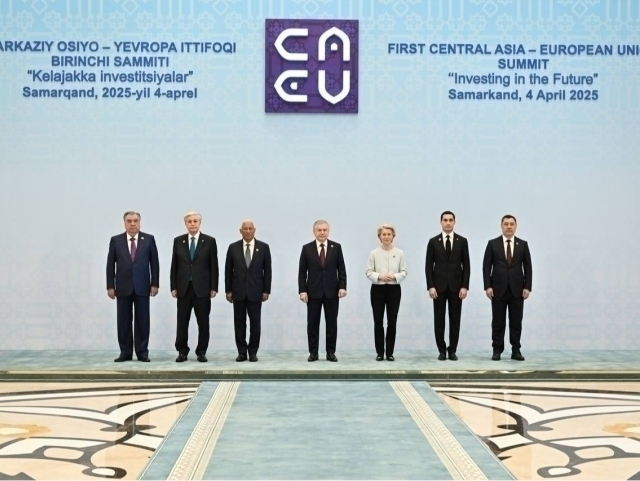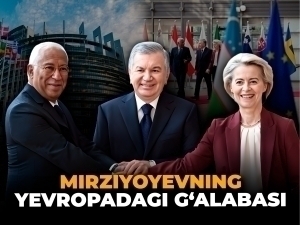What do the EU and CIS leaders agree on in Samarkand?
Review
−
04 April 2025 6823 9 minutes
Today, on April 4, at the first Central Asia–European Union summit held in Samarkand, the leaders of the regions reached agreements on a number of key issues. The outcomes of the summit were outlined in a joint declaration adopted at its conclusion.
According to the document, the leaders of Kazakhstan, the Kyrgyz Republic, Tajikistan, Turkmenistan, Uzbekistan, and the European Union agreed to elevate relations between the EU and Central Asia to the level of a strategic partnership, reaffirming their commitment to deepening cooperation amid evolving global and regional geopolitical dynamics.
“The EU reaffirmed its commitment to the objectives of the Central Asia Strategy adopted in 2019. The Joint Roadmap for Deepening EU–Central Asia Engagement, adopted in Luxembourg on 23 October 2023, has been instrumental in putting this strategy into practice. We acknowledged the role and importance of the high-level meetings between the Heads of State and the President of the European Council, held in Astana in 2022 and in Chulpon-Ata in 2023, as well as the EU–Central Asia Foreign Ministers’ Meeting held in Ashgabat on 27 March 2025, in preparing for this summit. We welcomed the achievements made and stressed the importance of maintaining the momentum in this regard,” the joint declaration stated.
The leaders also expressed their commitment to working together for peace, security, and democracy. They reaffirmed their dedication to upholding the independence, sovereignty, and territorial integrity of all states within their internationally recognized borders, and to fully complying with the UN Charter and the principles of international law. They emphasized the need to achieve a just, sustainable, and comprehensive peace in Ukraine as soon as possible, in accordance with the principles of the UN Charter. They also underscored the importance of adherence to the principles of the Organization for Security and Cooperation in Europe (OSCE).
“We reaffirmed that all states should refrain from the use or threat of force in their relations with each other, abide by international humanitarian law, and resolve conflicts by peaceful means,” the document states.
In the same context, the summit participants committed to respecting the aforementioned principles, particularly the sovereignty and territorial integrity of all states in all international and regional forums, and to refraining from actions that contradict these principles.
"In the same spirit, we reaffirmed our commitment to UN Security Council Resolutions 541 (1983) and 550 (1984). We stressed the need to uphold these international principles when participating in regional cooperation structures, which are of great importance for the development of relations between the EU and Central Asia. In this regard, Turkmenistan recalled its intention to strictly implement its international obligations in accordance with the principles of permanent neutrality.
In an increasingly complex world, the leaders expressed readiness to explore new avenues for cooperation in addressing shared security threats. They agreed to strengthen cooperation at bilateral, regional, and multilateral levels in combating cyber and hybrid threats, chemical, biological, radiological, and nuclear (CBRN) threats, radicalization, and terrorism. Additional areas of focus include strengthening border security and preventing drug and human trafficking. They agreed to launch a dedicated dialogue to counter violent extremism and enhance societal resilience against disinformation", the report stated.
The summit participants also reaffirmed their commitment to supporting Afghanistan’s transformation into a secure, stable, and prosperous state, governed inclusively and in full respect of human rights and fundamental freedoms for all citizens—including women, girls, and individuals from ethnic and religious groups and minorities. It was emphasized that Afghanistan must act as a peacemaker and fulfill its international obligations, both domestically and in its relations with neighboring countries.
“While expressing our shared concern about the humanitarian situation in the country, we recognized the need to support the people of Afghanistan. In particular, we called for ensuring full and equal access to education, in line with international standards, for women and girls in Afghanistan, as well as for their active participation in public life. In this regard, we supported the continuation of regular consultations between the Special Representatives and Ambassadors of the Central Asian countries and the European Union.
Cooperation on preventing sanctions evasion was also highlighted as an important aspect of EU–Central Asia relations. “In this context, we agreed to continue working with the European Union Special Representative for Sanctions, particularly to prevent the re-export of high-priority products,” the document concludes.
It was noted that significant efforts have been made to strengthen regional cooperation in Central Asia. These efforts aim to address challenges, ensure stability, enhance security, foster good-neighborly relations, achieve shared prosperity, promote sustainable development, accelerate the energy transition, and reduce carbon emissions. In this regard, the European Union welcomed the strengthening of regional cooperation through regular Consultative Meetings of the Heads of State of Central Asia. The EU also expressed its readiness to support both ongoing and future initiatives in this area.
The leaders welcomed the Treaty on the State Border signed between the Kyrgyz Republic and the Republic of Tajikistan in Bishkek on 13 March 2025. This agreement was regarded as a significant contribution to regional peace and prosperity.
“The European Union and Central Asian leaders agreed to build a deep and comprehensive partnership based on the full implementation of existing and future bilateral Enhanced Partnership and Cooperation Agreements (EPCAs). In this context, the EPCA signed between the European Union and the Kyrgyz Republic on 25 June 2024 was welcomed. Leaders also expressed anticipation for the signing of EPCAs between the EU and Uzbekistan, as well as between the EU and Tajikistan. They further noted the willingness of the EU and Kazakhstan to begin negotiations on Visa Facilitation and Readmission Agreements. These negotiations are expected to start following the completion of the relevant internal procedures concerning the negotiating mandate. We welcomed the recent steps taken by the European Commission in this regard,” the declaration stated.
Strengthening trade and investment links between Central Asia and the European Union is seen as essential for economic growth and the development and diversification of regional and intra-regional trade. To this end, the parties committed to regularly organizing economic events, such as the Central Asia–EU Economic Forum, to foster strategic dialogue and sustainable economic partnership. This cooperation will align with the European Union's external investment strategy, the Global Gateway. In the coming years, this strategy will be expanded to further realize the potential of region-to-region connectivity.
It was noted that, among the many common interests, enhancing cooperation on selected minerals of strategic importance—aimed at ensuring sustainable, secure, and diversified supply chains—is particularly vital. The Declaration of Intent adopted at the summit is expected to deepen cooperation in this area, boost economic stability, ensure mutual prosperity, and accelerate the transition to a green and digital economy.
“The European Union and Central Asia reaffirmed their commitment to strengthening sustainable transport links as a driver of economic growth and regional integration. The mobilization of €10 billion in support and investment for Central Asia at the Global Gateway Investors Forum in January 2024 marks an important step towards establishing effective mechanisms for regional transport corridors, logistics systems, value chains, and mutual market access. We also agreed to support the Trans-Caspian Transport Corridor Coordination Platform and key infrastructure projects along the Middle Corridor. The importance of peace and stability in the South Caucasus for the successful implementation of these projects was emphasized,” the document states.
Furthermore, in the context of global warming, extreme weather events, and ecological degradation, the protection of the planet is not a choice but a necessity. Therefore, the leaders agreed that the full and effective implementation of the Paris Agreement requires joint and sustained action. As part of this commitment, the parties agreed to intensify efforts to combat climate change, biodiversity loss, and pollution. The European Union welcomed the accession of all Central Asian countries to the Global Methane Pledge.
“Water is a key factor for the development and prosperity of Central Asia. Its sustainable and rational management is of vital importance to all countries in the region. The leaders of the European Union and Central Asia agreed to pursue innovative approaches to water and energy cooperation, and to enhance socially relevant, practical measures to protect and use water resources effectively. In this context, the leaders emphasized the need to strengthen and continue collaboration to improve the situation in the Aral Sea region and across the broader Aral Sea basin. Particular attention was given to efforts aimed at improving the performance and effectiveness of the International Fund for Saving the Aral Sea (IFAS), as well as the significance of the upcoming IFAS Summit to be held in Kazakhstan in 2026. The leaders also reviewed preparations for the UN Ocean Conference and recognized the importance of the Dushanbe Water Process. Additionally, they acknowledged international initiatives such as the 2024 One Water Summit and the UN General Assembly resolution on “Sustainable Mountain Development,”" the document states.
At the same time, the European Union and Central Asian leaders reaffirmed that the rule of law, and the promotion and protection of human rights and fundamental freedoms, are core values underpinning their bilateral relations. Ensuring freedom of expression and association, fostering an enabling environment for civil society and independent media, protecting human rights defenders, and upholding the rights of women, children, and workers remain at the heart of EU–Central Asia cooperation. The European Union reiterated its readiness to support efforts in this area at both regional and national levels.
In addition, the European Union and Central Asian leaders acknowledged the “European Union–Central Asia” Civil Society Forum as a vital platform for dialogue. This forum plays a key role in advancing the objectives of the EU Strategy for Central Asia, reinforcing the stability and welfare of societies, and promoting regional cooperation through active civil society engagement.
The role of the EU Special Representative for Central Asia was highly praised for contributing to the enhancement of EU–Central Asia cooperation and regional ties.
“We agreed to further strengthen our partnership and deepen cooperation in all areas of mutual interest, building on the outcomes of today’s Summit in Samarkand and the 20th EU–Central Asia Foreign Ministers’ Meeting in Ashgabat.
We express our deep appreciation to the Government of Uzbekistan for successfully organizing the first EU–Central Asia Summit in Samarkand,” the joint declaration states.
For your information, the summit, chaired by the President of the Republic of Uzbekistan Shavkat Mirziyoyev, was attended by President of the European Council António Costa, President of the European Commission Ursula von der Leyen, President of the Republic of Kazakhstan Kassym-Jomart Tokayev, President of the Kyrgyz Republic Sadyr Japarov, President of the Republic of Tajikistan Emomali Rahmon, and President of Turkmenistan Serdar Berdimuhamedov.
Live
All




